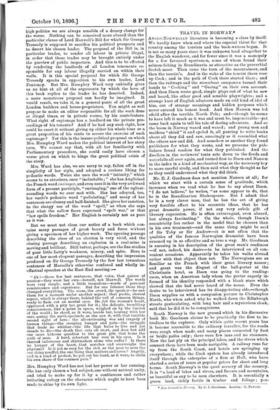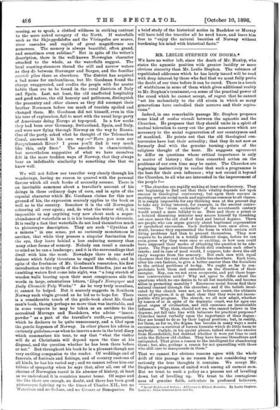TRAVEL IN NORWAY.*
ANGLO-NORWEGIAN literature is becoming a class by itself. We hardly know when and where the especial thirst for that country among the tourists and the book-writers began. It is not so many years since it was unknown land altogether to the English wanderer, and far fewer since it was a monopoly for a few favoured sportsmen, some of whom found their salmon-fishing in Scandinavia as attractive as the proverbial Scotch moor. Then came the turn of the mountaineer, and then the tourist's. And in the wake of the tourist there rose up Cook ; and in the path of Cook there started Gaze ; and then the railways and the steamboat companies turned their hands to " Cooking " and " Gazing " on their own account. And then Ibsen wrote good, simple plays out of what he saw and heard, like other good and sensible playwrights ; and a strange knot of English admirers made an odd kind of idol of him, out of strange meanings and hidden purposes which never entered his honest head. And then Nansen was led afield after the terrible North Pole; and—though he seems to have left it much as it was and must be, impenetrable—yet came back again to tell his tale of daring adventure. And so- the boom in Norway waxed and waxed ; and young men and maidens " skied " it and cycled it, all panting to write books about all they did and saw, amazingly as it resembled what the others saw and did. And somehow or another they found publishers for what they wrote, and we presume the pub- lishers found readers for what they published. And the dwellers in the reviewers' tents sate down to the fiords and waterfalls all over again, and turned first to Ibsen and Nansen in the index in a kind of mechanical way, as the necessary key to more careful study, and then said what they thought as far as they could understand what they did think.
Mr. E. J. Goodman does not mention Nansen at all; for which we start with a certain sense of gratitude, which increases when we read what he has to say about Ibsen.. "I do not believe," he writes, "as some appear to do, that he is the Scandinavian Shakespeare. But I admit that he is a very clever man, that he has the art of giving very forcible effect to his eccentric ideas, that he has great dramatic power, if not any very subtle gift of literary expression. He is often extravagant, even absurd, but always fascinating." On the whole, though Ibsen's eccentricity lies rather in the model that he chooses than in his own treatment—and the same thing might be said of Sir Toby or Sir Andrew—it is not often that the qualities of the famous Norwegian dramatist have been summed up in so effective and so true a way. Mr. Goodman is amusing in his description of the great man's readiness —if not, indeed, his desire—to be interviewed on all con- venient occasions. Apparently he takes his walks abroad rather with that object than not. The Norwegians are as familiar as the French with their great literary names ;. and great was the disgust of the hall-porter at the Christiania hotel, as Ibsen was going to the reading- room, when an American lady whom the porter eagerly in- formed of his identity responded with a blank stare which showed that she had never beard of the name. Even the-
desire to be interviewed has its disappointing side,—though Ibsen supplies us with a companion picture to Christopher North, who when asked why he walked down the Edinburgh streets gesticulating, with long hair and a mysterious cloak, said that he did it to be conspicuous.
South Norway is the new ground which in his discursive book Mr. Goodman claims to be practically the first to in- troduce to the explorer. Only within quite recent years has it become accessible to the ordinary traveller, for the roads were rough when made, and many places connected by foot or bridle paths only ; there were few inns and no steamers.
Now the last ply on the principal lakes, and the rivers which connect them have been made navigable. A railway runs far up from the South Coast, and hotels are springing up everywhere ; while the Cook system has already introduced itself through the enterprise of a firm at Hull, who have started a series of tours at popular prices for short and long terms. South Norway's is the quiet scenery of the country. It is "a land of lakes and rivers, and forests and mountains,
as beautiful as any to be seen elsewhere. It is essentially a green land, richly fertile in timber and foliage ; pos- • Now Ground in Norway. By E. J. Goodman. London: G. Newnes. easing, so to speak, a clothed wildness in striking contrast to the more naked savagery of the North. If waterfalls such as the Skjieggedalsfos and the Voringsfos are scarce, river cascades and rapids of great magnificence are numerous. The scenery is always beautiful, often grand, and sometimes even sublime." But in spite of the writer's description, there is the well-known Norwegian character attached to the whole, as the ' waterfalls suggest. The local coasting-steamers thread the still and narrow waters as they do between Stavanger and Bergen, and the familiar carriole plies there as elsewhere. The district has acquired a bad name for uncleanliness, but Mr. Goodman found the charge exaggerated, and credits the people with far neater habits than are to be found in the rural districts of Italy and Spain. Last, not least, the old unaffected hospitality and good nature, the old honesty and politeness, distinguish the peasantry and other classes as they did amongst their brother Norsemen before too much of tourists spoiled and changed them. Mr. Goodman did not himself, even in this his tour of exploration, fail to meet with the usual large party of Americans doing Europe at top-speed. In a few weeks they had been over Germany, Switzerland, Spain, and Italy, and were now flying through Norway on the way to Russia. One of the party, asked what he thought of the Telemarken Canal, answered in his own way :—" Have you seen our Susquehannah River? I guess you'll find it very much like this, only finer." The anecdote is characteristic, but nevertheless suggestive of what we have ourselves felt in the more trodden ways of Norway, that they always bear an indefinable similarity to something else that we know well.
We will not follow our traveller very closely through his wanderings, having no reason to quarrel with the personal flavour which all such books of necessity assume. There is an inevitable sameness about a traveller's account of his doings in these ordinary days of ours, and in spite of the especial character which Mr. Goodman claims for this new ground of his, the expression scarcely applies to the book as well as to the country. Somehow it is the old Norwegian colouring all over again ; and, do what the writer will, it is impossible to say anything very new about such a super- abundance of waterfalls as it is his bounden duty to chronicle. It is really a fact that waterfalls do not lend themselves much to picturesque description. They are such " Cynthias of a minute " in one sense, yet so curiously monotonous in another, that while they possess a singular fascination for the eye, they leave behind a less enduring memory than nany other forms of scenery. Nobody can recall a cascade to mind as he can a landscape ; and it is the surroundings that dwell with him the most. Nowadays there is one awful feature which fairly threatens to engulf the whole ; and in spite of the freshness of Mr. Goodman's researches, his first introduction to the rapids of the famous Hiinefos, just as the tumbling waters first come into sight, was " a long stretch of wooden walls bearing upon their most conspicuous side the words in large, ostentatious letters, Lloyd's Newspaper and Daily Chronicle Pulp Works." As he very truly moralises, it cannot be helped. But it scarcely suggests in Southern Norway such virgin ground as he led us to hope for. There is a considerable touch of the guide-book about Mr. Good- man's book, though perhaps no more than was inevitable, and in some respects he may be taken as an antidote to the accredited Murrays and Baedekers, who advise "insect. powder " as a part of the traveller's outfit,—a precaution which he declares to be quite unnecessary, and a libel upon the gentle liegemen of Norway. In other places his advice is curiously guileless,—as when he inserts a note in the brief diary which summarises his tour, to say that "what the visitor will do at Christiania will depend upon the time at his disposal, and the question whether he has been there before or not." But throughout his book he is a pleasant though not very exciting companion to the reader. Of weddings and of funerals, of festivals and &hinge, and of country customs of all kinds, he has his varied say ; and we cannot refuse him our tribute of sympathy when he says that, after all, one of the charms of Norwegian travel is its absence of history, at least as we understand it in countries nearer home. Of sagas and the like there are enough, no doubt, and there has been good picturesque fighting up to the times of Charles XII., but no Waterloos and no Sedans, and no Cmsars or Bonapartes. So
a brief study of the historical notice in Baedeker or Murray will have told the traveller all he need know, and leave him free to "enjoy the natural beauties of Norway without burdening his mind with historical facts."



















































 Previous page
Previous page